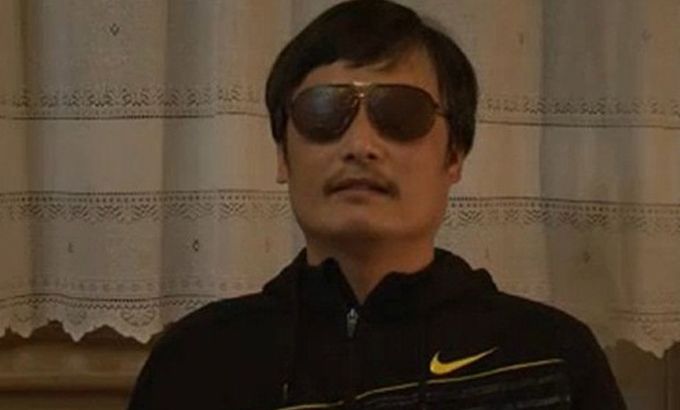Obama silent on China dissident
US president declines to comment on asylum situation as it threatens to eclipse Beijing visit by Hillary Clinton.

The US has not confirmed whether blind Chinese dissident Chen Guangcheng, who escaped house arrest last week and is believed to be under US protection in Beijing, is in its diplomatic quarters.
Speaking on Monday, US President Barack Obama declined to comment on the situation, but said he believed China would become stronger and more prosperous as it advanced human rights.
The issue is threatening to eclipse a visit by Hillary Clinton, the US secretary of state, who is expected to arrive in China on Wednesday.
Chen escaped 19 months of house arrest on April 21. Since then, several supporters have been detained by police, but most have since been released.
Bob Fu of the Texas-based rights group ChinaAid said on Monday that US and Chinese officials were ironing out a deal to secure asylum for Chen.
“The Chinese top leaders are deliberating a decision to be made very soon, maybe in the next 24 to 48 hours,” Fu said, citing a source close to the US and Chinese governments.
China’s ‘willingness’
Both sides are “eager to solve this issue”, according to Fu, a former teacher at a Communist Party academy in Beijing whose advocacy group focuses on the rights of Christians in China and who maintains a network of contacts in the country.
“It really depends on China’s willingness to facilitate Chen’s exit,” Fu said.
Nicholas Bequelin, a senior researcher of Human Rights Watch, told Al Jazeera that although both the US and China were trying to have the smoothest possible relationship, it became more difficult when human rights issues were brought into the equation.
“Therefore the US is trying balance these two requirements; one is that you can’t drop human rights completely, and secondly it still needs to have a China that is ready and willing to engage,” he said.
John Brennan, Obama’s top counter-terrorism adviser, told a US television channel on Sunday that the US president was approaching the issue by trying to “balance our commitment to human rights” while continuing “to carry out our relationships with key countries overseas”.
“We’re going to make sure that we do this in the appropriate way and that appropriate balance is struck.”
Kurt Campbell, the assistant US secretary of state for East Asian and Pacific affairs, arrived in China on an unscheduled visit on Sunday, but did not answer questions about the purpose of his visit.
The issue is threatening to eclipse a planned visit by Hillary Clinton, the US secretary of state, in the coming days.
The European Union, meanwhile, has urged China to exercise “utmost restraint” in its handling of the dissident.
“We call on the Chinese authorities to exercise utmost restraint in dealing with the matter, including avoiding harassment of his family members or any person associated with him,” the Delegation of the European Union to China said in a statement on Monday.
“Human rights defenders should be treated in full compliance with Chinese laws and constitution.”
Chen, a self-schooled legal advocate who campaigned against abortions forced under China’s “one child” policy, was held under extra-legal detention in his village home in Linyi from September 2010, when he was released from jail for charges he said were spurious.
Escape testimony
Chen’s wife, Yuan Weijing, and child did not escape with him, and human-rights activists have voiced worry that they and Chen’s other relatives might have suffered abuse at the hands of police and officials angry about his escape.
Testimony emerged on Sunday from a fellow dissident Hu Jia about how Chen escaped.
According to Hu, who met Chen in Beijing after his escape, Chen scaled a wall by night to escape past guards and bristling surveillance equipment.
| IN VIDEO |
|
|
| Fellow dissidents react to Chen’s escape |
“We talked about how Guangcheng climbed over a high wall in the middle of the night and fell over more than 200 times, and how he wounded himself when he fell down from the wall and couldn’t stand up,” Hu told Reuters news agency.
“But he kept going and stumbled forward. And, as I remember, he said it took 20 hours to get past all these obstacles to get to the people waiting to meet him.”
Photographs provided by Hu showed the pair meeting in Beijing. Hu was detained by police for 24 hours of interrogation on Saturday after meeting Chen upon his arrival in the capital.
Hu said Chen had remained indoors for long periods so the people watching him became accustomed to not seeing him for a few days. After escaping, Chen was then taken to Beijing, 500km away, by supporters.
“It’s clearly understood that his supporters took Chen Guangcheng to the safest place, and our understanding is that the safest place means the United States embassy,” Hu said.